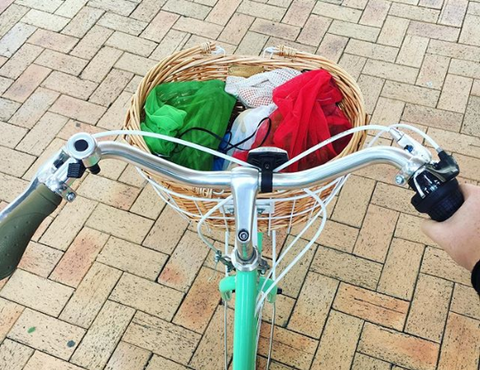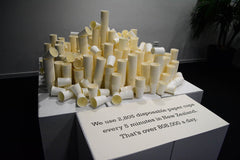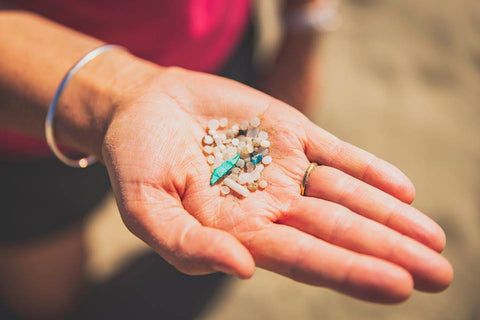Reducing carbon emissions requires action from all of us – government, businesses and individuals. So here’s a quick guide on what you can do…

Ride Your Bike Is it a coincidence that Denmark is consistently ranked in the top 3 happiest countries and also has one of the highest per capita rates of cycling? Maybe, but they’ve also found that children who cycle and walk to school are much better at concentrating. The more people who cycle the safer it will be, so download a copy of Christchurch’s cycling maps and get on your bike (Also, Denmark and Christchurch are both flat, so we have no excuse!)
Support Local and Ethical Businesses If we want a world where businesses take responsibility for the environment, we have to support them. Shopping locally keeps money in the community and reduces carbon emissions and packaging. When you shop from ethical businesses your dollars are working all the way down the supply chain improving lives and the environment. To help you out, we've put all our NZ-made products on sale until the end of May.
Eat Less Meat. But this doesn’t mean you have to be vegan or even vegetarian, if we all switched to eating a Mediterranean diet (chicken a couple of times a week, beef once a month, and plenty of plant based foods) we could solve 15% of global warming by 2050! It’s equivalent of taking 1 billion cars off the road.
Switch to Reusables New Zealanders use 808,000 disposable coffee cups every year, wasting re sources and emitting carbon. Reusable coffee cups are bulky and can leak in your bag – try a Stojo collapsible coffee cup which conveniently fits in your pocket or bag.
sources and emitting carbon. Reusable coffee cups are bulky and can leak in your bag – try a Stojo collapsible coffee cup which conveniently fits in your pocket or bag.
Speak Up – Fill in the CCC survey to let the council know how you are reducing your carbon emissions and how you’d like them to improve.
]]>
Plastic is lightweight and cheap, making it dangerously impactful on the environment. Think of a plastic bag and how much it resembles a parachute when it gets caught in the wind. Even if we don’t purposefully litter, we often unintentionally cause plastic to end up in the ocean. Here are some of the ways it happens and what we can do about it.

At the beach
At Cape Arnham in the Northern Territory in Australia footwear and jandals were found to be the most common item littering the beach. Jandals are inexpensive and when we think of them as disposable we neglect to look after them, often leaving them below the high tide line to be swept out to sea by the waves.
If every New Zealander loses a pair of sunglasses or jandals every year, there’s over 5 million plastic items straight into the sea.
Solution: Value your jandals as you would if they were expensive. Don’t leave any debris at the beach, including shoes, tents, plastic cutlery or cups.
Poor waste management systems
The majority of the countries that contribute to marine plastic litter are middle-income countries, where the economy is growing faster than the waste management infrastructure. However, New Zealand’s waste management systems aren’t perfect. Next rubbish day look at your street after the collection – there are always bits of plastic that have escaped as the wheelie bin is tipped into the truck.
Added to this, landfills aren’t sealed while they’re in use, so any loose plastic that is dumped can easily blow away. This plastic eventually ends up in the ocean.
Solution: Use a paper bin liner to make sure your rubbish is contained before putting it in the wheelie bin. Reduce your plastic consumption as much as possible to limit your rubbish.
Fishing gear
The largest contributor of plastic waste to the Great Pacific Garbage Patch comes from fishing equipment, amounting to a whopping 46% (by weight). These “ghostnets” keep drifting through the oceans entangling whales, dolphins and turtles. Whether or not you’re a commercial fisher, if you choose to eat net-caught fish you are supporting this practice.
Solution: Eat fish from the sustainable fish guide http://bestfishguide.org.nz/about/ to ensure you’re supporting safe fishing practices that do not harm ocean life. Look after your fishing gear, take it home and dispose of it correctly.
Microfibres
Every time we wash a fleece jacket it can release thousands of plastic fibres that are too small to be filtered out at sewage treatment plants. Studies indicate that synthetic fibres in our clothes could be poisoning our waterways and, by extension, the food we eat.
Solution: Wear natural fibres. Spot wash fleece and only machine wash them when absolutely necessary. Use face cloths and cleaning cloths made from natural fibres.

Manufacturing
Evans Bay in Wellington is covered with plastic ‘nurdles’ – the raw plastic beads or pellets used to make the products that we like to buy. These nurdles have escaped from the local manufacturers before they’ve even been made into anything useful, and have been described by environmentalists as “an oil spill, just a different form”.
The more plastic goods we consume, the more plastic is manufactured and the more nurdles are likely to escape into the ocean.
Solution: If we buy fewer plastic items, fewer nurdles will be created and land in our waterways. We’ll save money too, and space – you won’t have to Maree Kondoo your house!
Cigarette butts
Dropping cigarette butts is littering, and they go straight down the drains to the ocean. Cigarette butts are the most common item found on beach cleanups around the world, they’re made of plastic and do not biodegrade.
Solution: If you smoke, dispose of the butt in a responsible way. When you’re out use a pocket ashtray to keep the butt safe until you can dispose of it.
Littering
Ok, so we don’t litter but sometimes we accidentally drop a bottle lid, or ice-cream wrapper while we’re juggling the kids, the shopping and the car keys. If we all accidentally drop one piece of plastic every year, that’s five million pieces of plastic waste.
Solution: Accidents happen, so when you’re at the beach help others by picking up any rubbish you see. Download the app Litterati to make picking up rubbish into a treasure hunt – and join our Litterati club, named “The Rubbish Whisperer”, to add your total to ours!
]]>